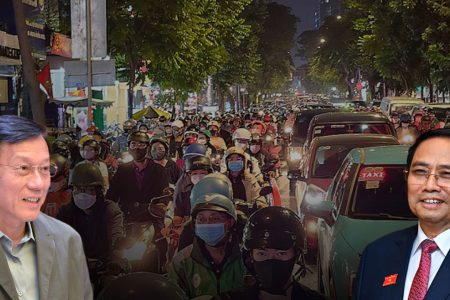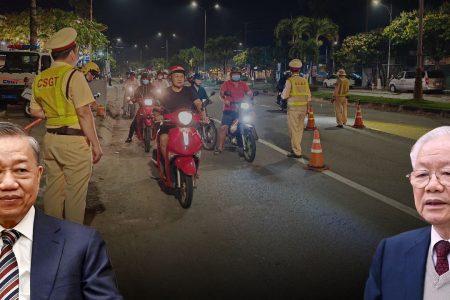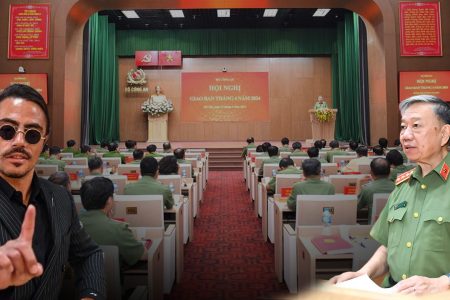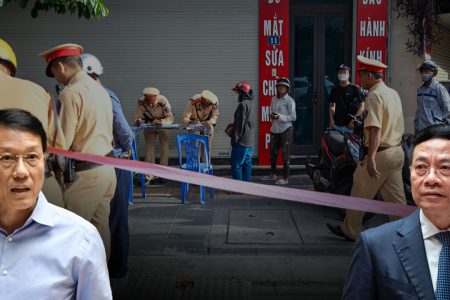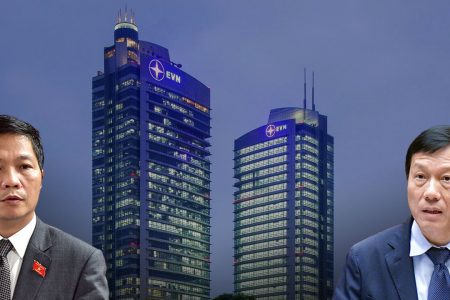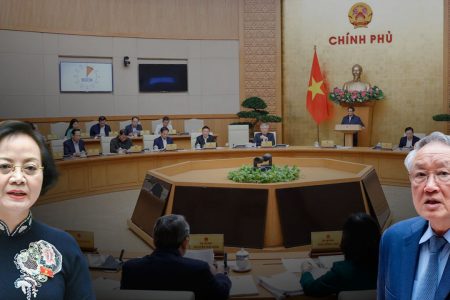
Importance of Coast Guard
Recently, mobile phone users in Vietnam often receive a message with the content: “Actively participate in the online contest Learning about Vietnam Coast Guard at address… to contribute to protection of the islands and seas of the Fatherland in the new situation.” This shows that the Vietnamese government is showing strong propaganda for this force.
With the importance of the sea and ocean today, along with China’s aggressive and malicious actions to monopolize the South China Sea (Vietnam calls it the East Sea), more than ever, the role of the Vietnam Coast Guard is very important in the preserve and protect the security as well as the territorial sovereignty of the country.
As China is using “gray zone” strategy in the South China Sea, facing China’s coast guard ships, fishermen and maritime militia, but avoiding creating an excuse for China to use force, the Vietnam Coast Guard is the main force to fight to protect the country’s sovereignty, sovereign rights and jurisdiction. In addition, the Coast Guard also contributes together with the Vietnam Navy to protect fishermen at sea, and at the same time protect security at sea. Therefore, building capacity and strength for this force is an urgent priority. Even major maritime powers in the world such as the US and Japan have helped equip the Vietnam Coast Guard with modern patrol boats with the desire to help Vietnam maintain its sovereignty over its sea and islands.
However, recently, a series of the most senior generals of the Coast Guard Command were recommended to be disciplined for many serious violations. This causes great concern for the Vietnamese people, who are interested in the country’s sea and islands.
Vietnam Coast Guard, who are you?
Before 1998, the Vietnamese government did not have a dedicated Coast Guard agency, but only the Navy patrols offshore and other military activities.
On August 28, 1998, the Vietnam Coast Guard Department under the Naval Command was established, marking the birth of the Vietnam Coast Guard. At the time of its establishment, the Coast Guard Department was only a functional department and did not command the Coast Guard Regions established later.
In 2008, the Coast Guard Department was transferred to the Ministry of National Defense and at the same time the Coast Guard Regions were transferred to the department.
In 2013, the Coast Guard Department changed its name to the Coast Guard Command under Decree No. 96/2013/ND-CP, dated August 27, 2013 of the Government. Having a seal with the national emblem, which is an agency under the Government of Vietnam’s name. The Vietnam Coast Guard has its own state budget, and its own warning signs and uniforms are regulated by the Government.
On September 10, 2014, Coast Guard Regions were renamed to Coast Guard Region Commands by decision of the Minister of Defense.
The latest legal document regulating the organization and operation of the Coast Guard is the Law on Coast Guard 2018.
As does so?
One thing that a lot of people wonder before this, is the Coast Guard has committed any violation to be recommended such discipline?
The press release of the Central Inspection Commission of the Communist Party of Vietnam (CSB) recently stated: “The Standing Board of the Party Committee of the Communist Party of Vietnam CSB for the 2015-2020 term violated working principles and regulations, lacked responsibility, loose leadership, direction, lack of inspection and supervision, so that the CSB Command and many officials and party members, including key officers and leaders of the Command, and leaders and commanders subordinate units lack of training in political, moral and lifestyle qualities; violate the Party’s regulations, the State’s laws and the regulations of the Ministry of Defense in the management and use of finance, implementation of capital construction investment projects, procurement of materials and technical equipment techniques and in the fight against smuggling, maintaining security, order and safety at sea.
The above violations have caused very serious consequences, causing great loss of money and property of the State, affecting the performance of political tasks, damaging the reputation of Party organizations and the Army, causing frustration. among officers and soldiers.”
What is very special is that the information is only so, very general, without detailed information. The domestic press is all just republishing this press release from the Central Inspection Commission.
But we can summarize that the mistakes of the leaders of CSB this time include: … management, financial use, implementation of capital construction investment projects, procurement of materials, equipment, etc. technical equipment and in the fight against smuggling, maintaining security, order and safety at sea.”
Among those who were recommended to be disciplined by the Central Inspection Commission, with the heaviest form of “Expulsion from the Party,” there were Mr. Colonel Phung Danh Thoai, Party member, Secretary of the Party cell, Head of Petroleum Department, Department of Post-Oil need; Major Luu The Duc, Party member, Deputy Head of the 2nd Reconnaissance Corps.
This can be understood that the two people mentioned above have committed violations related to their professional activities as petroleum management of CSB. Some anonymous sources right in the CSB said: There has been a lot of corruption here. Many business trips and patrols of the CSB are only ‘on paper’ so that the leaders can take that amount of petrol and sell it among themselves. In a nutshell, these leaders have “drawn” a lot of “false” activities of the CSB force, thereby taking a lot of gasoline and selling it out, making illegal profits of hundreds of billions of dong.
In addition, public opinion is not strange that the procurement of equipment for the government is always overpriced while the quality is not assured. For example, the cases of Vinashin and Vinalines show that the price increases to buy “discarded” equipment but at this sky-high prices. For example, according to the investigation conclusions of the Investigation Police Agency of the Ministry of Public Security, the floating dock 83M in the above case was decided to buy by Vinalines in October 2007. At that time, this dock was 42 years old (manufactured in 1965), the owner of this dock in Russia only offered a selling price of $5 million. However, Vinalines bought through a brokerage company in Singapore for up to $9 million, according to the decision of the Chairman of Vinalines’ Board of Directors at that time, Mr. Duong Chi Dung, approved.
Similar acts of corruption are not only found in cases like Vinashin and Vinalines, but now they can also appear at the headquarters of CSB Vietnam?
In addition, the fishermen are not unfamiliar with the acts of protection and collusion with smugglers at sea by the CSB itself. Smuggling activities at sea are very large, including petroleum smuggling, drug smuggling… These smuggling lines have the support and protection of the maritime security force, the CSB. Therefore, the Central Inspection Commission has identified these violations as “very serious.”
The irony is that among those who were proposed to be disciplined was Mr. Doan Bao Quyet – Deputy Political Commissar of the Vietnam Coast Guard. In early May this year, Mr. Quyet published an article in the National Defense magazine, in which he affirmed: “Over the past years, the Vietnam Coast Guard has thoroughly grasped and strictly implemented the directives and resolutions of the above, there are many guidelines and measures to lead, direct the work of political education, ideological orientation, build a steadfast, steadfast, ethical, and pure lifestyle. promote the quality of ‘Uncle Ho’s soldier – a soldier of the Coast Guard’.”
Now I understand the quality of the “Uncle Ho’s army” of the CSB is this, corruption, and crime.
Need a blood change
According to Article 4, Clause 1 of the Law on CSB, the Coast Guard is placed under the absolute and direct leadership in all aspects of the Communist Party of Vietnam, the domination of the State President, and the unification of management of the government and the direct direction and command of the Minister of Defense.
Those who committed these crimes are like a direct punch to the Ministry of Defense and the Communist Party of Vietnam.
In the past time, with huge investment in the navy and the CSB, it is essential. That money is taken from the national budget, that is, from the tax money of the people. However, with such egregious mistakes, can people trust the procurement and repair activities of the Vietnamese army and government?
There have been many real cases where it is law enforcement agencies that cooperate with criminals to make a profit. But now CSB’s activities of protection and collusion with smuggling are proof of how corrupt the current Vietnamese State apparatus is?
In addition, with such corruption, will the CSB force and the Vietnamese navy be strong enough to protect the country against Chinese aggression? Not to mention that China can easily use money to “bribe” and neutralize important military forces in the defense of the sea and islands.
The Ministry of Defense and the Communist Party must answer these questions.
Thoibao.de (Translated)







